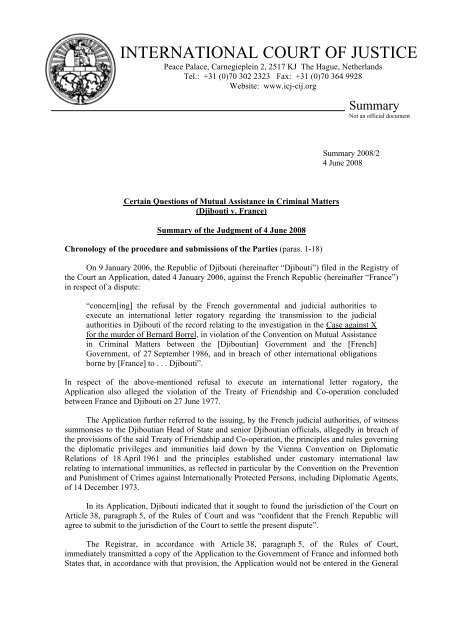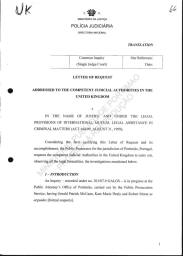Letters Rogatory Explained: Facilitating Legal Cooperation In Between Countries

Definition of Letters Rogatory
Letters rogatory are formal requests made by a court in one territory to a court in another territory, looking for support in getting evidence or testament for a legal action. This step-by-step mechanism is essential in the context of worldwide regulation, where legal systems may vary, and cross-border cooperation is essential. Letters rogatory assist in the celebration of information that may be critical for adjudicating instances, especially in instances including intricate transnational problems.
Commonly, these requests occur in civil, criminal, or administrative issues where an event calls for proof that is situated outside the territory of the requesting court. The letters work as a way to make certain that the principles of due procedure are upheld, enabling courts to gain access to evidence that might or else continue to be hard to reach as a result of legal or geographic barriers.
The use of letters rogatory is governed by international treaties, bilateral arrangements, or domestic regulations, which mark the procedures and commitments of the courts entailed. It is necessary to note that the execution of such requests is not guaranteed; they depend on the regulations and techniques of the territory getting the letter. Therefore, letters rogatory are a pivotal tool for promoting legal collaboration and guaranteeing justice across borders.
The Refine of Issuing Letters Rogatory
Issuing letters rogatory entails a structured process that guarantees compliance with both domestic and global lawful criteria. The requesting event, normally a court or legal authority, drafts a formal demand outlining the nature of the assistance looked for, the evidence or details required, and the legal basis for the demand. This file must be accurate to help with understanding by the international jurisdiction.

The following action entails sending the letters rogatory to the marked international authority. This is usually done with polite channels or global lawful help structures, guaranteeing that the request is received and acknowledged by the foreign court. The foreign court after that refines the request according to its own legal procedures, inevitably reacting to the requesting party with the desired details or proof, thus facilitating global lawful teamwork.
Value in International Law
The significance of letters rogatory in global regulation can not be overemphasized, check this site out as they work as a vital mechanism for judicial cooperation throughout boundaries. These formal ask for support in legal issues enable courts in one jurisdiction to inquire, evidence, or the existence of witnesses from one more jurisdiction, therefore assisting in the administration of justice in multinational situations.
Letters rogatory are particularly vital in the context of globalization, where legal disagreements typically cover several nations. They allow the collection of evidence that could otherwise be inaccessible, making sure that lawful procedures are educated and fair. By cultivating partnership between judicial systems, letters rogatory help promote the guideline of regulation and promote shared web link regard among countries.
Furthermore, the usage of letters rogatory demonstrates a commitment to worldwide norms and concepts of teamwork, showing the interconnected nature of contemporary legal methods. It highlights the importance of adhering to established treatments and treaties, such as the Hague Convention, which provides a framework for these requests - Letters rogatory. Eventually, letters rogatory boost the effectiveness of lawful procedures, ensuring that justice is not hindered by geographical limits
Challenges and Limitations
In spite of their relevance, letters rogatory face numerous challenges and limitations that can hinder their efficiency. One primary issue is the varying lawful structures and procedures throughout territories, which can result in misunderstandings and hold-ups in the implementation of demands. Various nations might have distinct requirements for the credibility of letters rogatory, complicating the process even more.
Furthermore, the commonly lengthy nature of global lawful teamwork can hinder timely access to evidence or witnesses. This hold-up might detrimentally influence recurring examinations or lawful proceedings, specifically in instances requiring immediate activity. In addition, the lack of sources and training in some jurisdictions can lead to inadequate handling of demands, causing insufficient or incomplete reactions.
Nations with less formal legal look at here now systems may struggle to comply with the step-by-step roughness expected in letters rogatory. These difficulties require continuous discussion and reform to boost the efficacy of letters rogatory in legal participation.
Study and Examples

On the other hand, obstacles can occur, as seen in an instance including a European nation seeking evidence in a continuous criminal issue from a non-EU country - Letters rogatory. The process was postponed due to administrative difficulties and differing legal requirements, inevitably hindering the examination
These instances show that while letters rogatory can facilitate worldwide participation and expedite legal procedures, they additionally highlight the demand for clear communication and understanding of lawful frameworks in between nations. Such situation studies highlight the significance of refining this device to improve efficiency and effectiveness in global lawful matters.
Verdict
In summary, letters rogatory serve as an essential device for helping with legal participation in between countries, ensuring the collection of proof and statement across territories. Their value in worldwide law can not be overstated, as they promote due process and enhance the performance of cross-border legal proceedings.
Letters rogatory are formal demands made by a court in one territory to a court in another territory, seeking aid in acquiring evidence or testimony for a legal case. The requesting party, typically a court or lawful authority, drafts a formal request outlining the nature of the support looked for, the proof or info required, and the lawful basis for the demand. The international court after that processes the request according to its very own lawful treatments, inevitably reacting to the requesting celebration with the popular information or proof, thus helping with international legal collaboration.
Additionally, the usage of letters rogatory shows a dedication to global norms and concepts of cooperation, showing the interconnected nature of contemporary lawful practices.Worldwide lawful cooperation through letters rogatory is not without its real-world effects, as illustrated by various situation researches that highlight both challenges and successes.